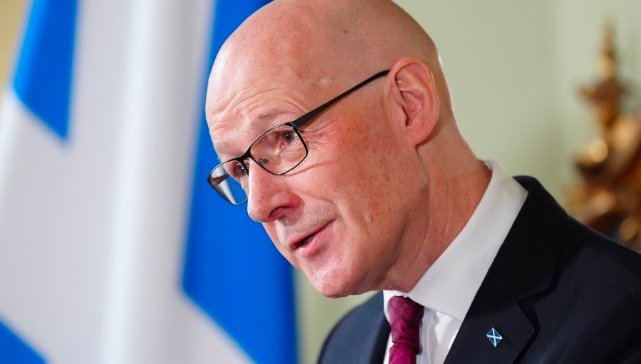First Minister John Swinney has called on Scotland’s political, religious and civic leaders to come together in defence of democracy at a high-profile summit in Glasgow — but his exclusion of Reform UK from the event has reignited tensions across the political spectrum.
Held against the backdrop of rising voter discontent and concerns over misinformation and political extremism, the forum brought together around 50 organisations, including political parties, faith groups, and community charities. The aim: to forge a common front against democratic backsliding and to “assert the values of who we are as Scots.”
However, the absence of both Reform UK and the Scottish Conservatives cast a long shadow over the initiative, with critics accusing Swinney of politicising the event in a bid to marginalise emerging political forces.
“Cohesive society where everyone feels safe”
Speaking ahead of the summit, Swinney framed the forum as a response to global democratic uncertainty and rising polarisation, stating:
“Today’s civic gathering aims to unite political and civic leaders… to bring people together and create a cohesive society where everyone feels safe and at home.”
But despite this inclusive language, Reform UK — a party gaining traction in Scotland ahead of the 2026 Holyrood election — was not invited.
When the summit was first announced in February, Swinney made headlines for declaring a need to “lock out the far right” from Scottish politics. Reform UK, often associated with controversial rhetoric but staunchly denying far-right affiliations, was seen as the primary target.

Early Scottish Government briefing documents for the event, seen by BBC Scotland News, made no mention of the party but focused on broader themes such as misinformation, inequality, and electoral interference.
Opposition Reactions: “A helpful political tool”
Reform UK councillor Thomas Kerr, a former Conservative, was sharply critical of the party’s exclusion.
“If this summit is to mean anything, let it be the moment when our political leaders stop blaming the public for their discontent,” Kerr said. “We need honesty, competence, and courage.”
Scottish Labour leader Anas Sarwar accused Swinney of “talking up” Reform UK to boost SNP electoral strategy.
“This is more about a helpful political tool than tackling what’s pushing people towards divisive politics,” he said. “The summit risks becoming the Scottish establishment talking to itself.”
Scottish Liberal Democrat leader Alex Cole-Hamilton used his attendance to push for real policy delivery, saying:
“You persuade no-one by labelling them or diminishing how they feel. You need to listen to them and govern well.”
Tory No-Show and Calls for a Crime Summit
The Scottish Conservatives, meanwhile, boycotted the event entirely. Party leader Russell Findlay described the summit as a “talking shop” and instead called on the government to convene a summit on organised crime in light of recent gang-related violence.
Cole-Hamilton dismissed the boycott, accusing Findlay of choosing to “skulk at home” rather than engage in dialogue.
Green Party Cautions Against “Legitimising” Far Right
Scottish Green co-leader Patrick Harvie used the summit to issue a stark warning:
“You can’t beat the far right by acting like them. Legitimising their toxic rhetoric simply makes them louder.”
Harvie linked the rise in political anger to economic grievances:
“People across Scotland need real change… not scapegoating and division.”
What’s Next for Reform UK in Scotland?
Despite being excluded from the summit, Reform UK’s momentum continues to build in the polls. With high-profile defections like Thomas Kerr and growing visibility across working-class communities, the party poses a serious electoral challenge — particularly to the SNP in seats where support for independence has waned but anger at Labour and the Tories remains high.
For now, Swinney’s summit has sparked a national conversation. But whether it fosters unity or further fractures Scotland’s political landscape may depend on how the public interprets the exclusion of a party claiming to represent rising anti-establishment sentiment.


















